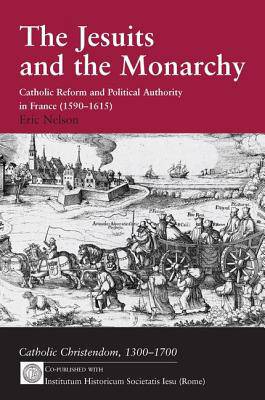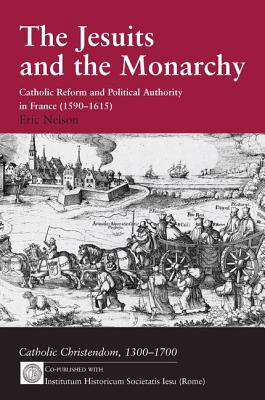
- Retrait gratuit dans votre magasin Club
- 7.000.000 titres dans notre catalogue
- Payer en toute sécurité
- Toujours un magasin près de chez vous
- Retrait gratuit dans votre magasin Club
- 7.000.000 titres dans notre catalogue
- Payer en toute sécurité
- Toujours un magasin près de chez vous
The Jesuits and the Monarchy
Catholic Reform and Political Authority in France (1590-1615)
Eric Nelson
48,95 €
+ 97 points
Description
The first three decades of Bourbon rule in France coincided with a period of violent fragmentation followed by rapid renewal within the French Catholic community. In the early 1590s, when Henri IV - Protestant head of the Bourbon house - acceded to the throne, French Catholics were at war with each other as Leaguer and Navarrist factions fought both militarily and ideologically for control of Catholic France. However, by 1620 a partially reconciled French church was in the process of defining a distinctive reform movement as French Catholics, encouraged by their monarchs, sought to assimilate aspects of the international Catholic reformation with Gallican traditions to renew their church. By 1650 this French Catholic church, and its distinctive reform movement forged in the decades following the collapse of the Catholic League, had become one of the most influential movements in European Catholicism. This study reconsiders the forces behind these dramatic developments within the French church through the re-examination of a classic question in French history: Why was the Society of Jesus able to integrate successfully into the French church in the opening decades of the seventeenth-century, despite being expelled from much of the kingdom in 1594 for its alleged role in the attempted assassination of the king? The expulsion, recall and subsequent integration of the Society into the French church offers a unique window into the evolution of French Catholicism between 1590 and 1620. It provides new insight into how Henri IV re-established royal authority in the French Catholic church following the collapse of the Catholic League and how this development helped to heal the rifts in French Catholicism wrought by the Leaguer movement. It also explores in unprecedented detail how Henri played an important role in channelling religious energy in his kingdom towards forms of Catholic piety -exemplified by his new allies the Jesuits - which became the foundation of
Spécifications
Parties prenantes
- Auteur(s) :
- Editeur:
Contenu
- Nombre de pages :
- 296
- Langue:
- Anglais
- Collection :
Caractéristiques
- EAN:
- 9780754638889
- Date de parution :
- 28-08-05
- Format:
- Livre relié
- Format numérique:
- Genaaid
- Dimensions :
- 156 mm x 233 mm
- Poids :
- 709 g







